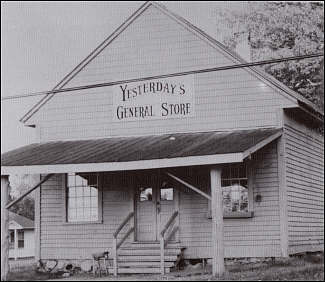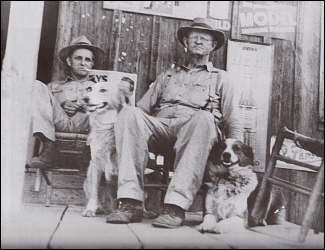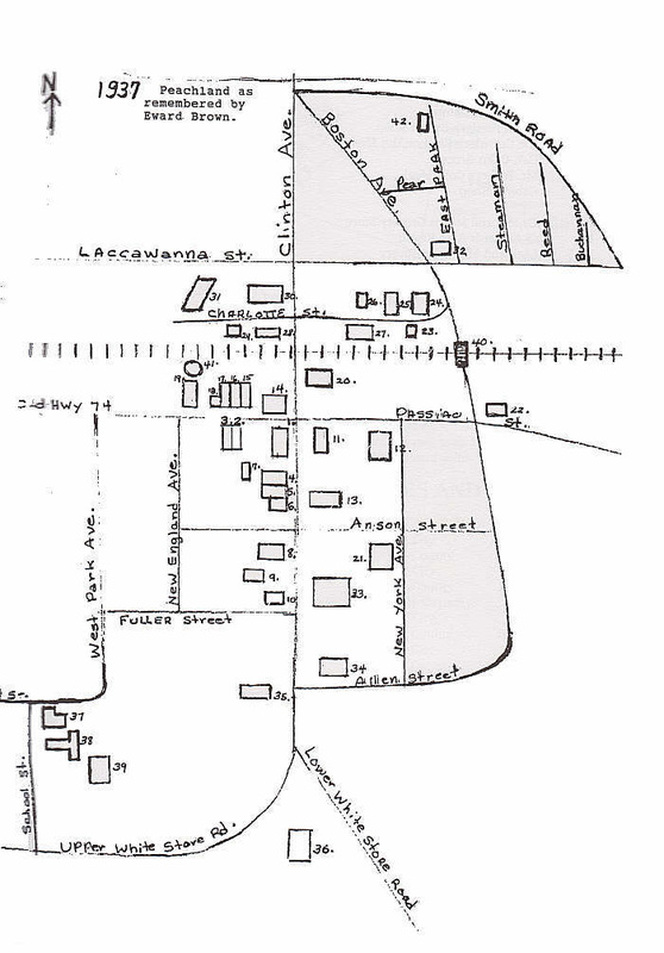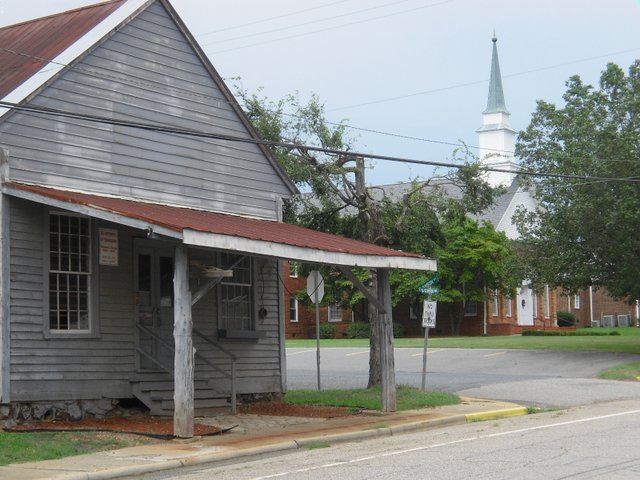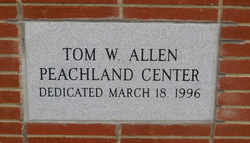History of Peachland
|
In March 1895, the North Carolina General Assembly ratified an act to incorporate a small town in western Anson County – and the Town of Peachland was officially formed on March 31, 1895.
The community's rich history dates back to the late 1700s when Charlotte lawyers enroute to the Anson County Courthouse in Wadesboro would camp overnight near a spring because the trip by horseback took more than a day's travel time. The route became known as Lawyers Road, the water source was called Lawyers Spring and, today, the Lawyers Spring Primitive Baptist Church is located in the area. Originally, the community was known as Mulcahy. In 1888, community fathers gathered to discuss renaming the unincorporated town Fruitland. It is not known who suggested the name "Peachland" - to represent the natural beauty of Pad Gray's peach orchard that was located south of the town – but the name met the approval of town leaders. Local lore alludes to the panning of gold in the area during Anson County's "gold rush." Several mining operations were underway in Anson County during that time and the gold was shipped to a mint in Charlotte for coinage prior to the War Between the States. Prior to incorporation, a one-room schoolhouse was constructed in the Lawyers Spring area. A Methodist church was organized in 1885, followed by a Baptist church in 1890. Other churches soon followed over the next century – to include David's Temple Revival Church, Deep Springs Baptist Church, Fountain Hill United Methodist Church, Freedom Baptist Church, Hopewell United Methodist Church, Lawyers Springs Primitive Baptist Church, Long Pine United Methodist Church, Mineral Springs Baptist Church, Mount Carmel Baptist Church, Mt. Olive Baptist Church, New Home Baptist Church, New Zion Church, Peachland Baptist Church, Peachland Gospel Tabernacle, Peachland Methodist Church, Peachland Presbyterian Church, St. James Mission Church and Word of Life. The first elected mayor of Peachland was Vernon Allen. The town's street names reflect the New Jersey heritage of the founding fathers: Passiac, New England, New York, Park and Boston, for example. Passaic Street was Highway 74, built in 1923-24, before the four-lane was constructed to bypass the downtown area. |
An early map, drawn by Eward Brown for inclusion in Peachland's Centennial Celebration publication, pinpoints the location of local businesses – such as Griffin Drugstore, James Shoe Repair Shop, Redfern Store, Crowder's Blacksmith Shop, Preslar's Barber Shop, Cohn Grocery, a cabinet shop, Tucker's Corn Meal Store, Caudle and Meggs Grocery Store, Leak and Marshall Grocery, Lowery Seed Store, Crowder's Pool Hall, the Bank of Peachland, a Southern Bell telephone company office, an auto repair shop, Brown's Garage, Huntley Gin and Lumber, the Peachland Depot, Baucom's Fertilizer Co., Peachland School and Peachland Elementary.
Perhaps the most notable Peachland resident was Dr. Parks Turner Beeman, a pacifist who was opposed to the War Between the States. For an anti-Jefferson Davis (the president of the Confederate States of America) remark, Beeman was arrested and spent time at Camp Holmes, located near Raleigh. When released, he refused assistance in his return to Peachland and local lore says he walked the 140 miles back to Anson County. He is remembered for his epitaph, "I Fed Fever," that is inscribed on his tombstone in the family cemetery near Peachland. He favored the practice of feeding patients who had a fever, stating a feverish patient is weak enough without making him suffer malnutrition, too. He also served in the N.C. Senate after the War Between the States had ended. On April 1, 1995, a time capsule was buried with the stipulation that it would be opened on April 1, 2045 – Peachland's 150th birthday. The town's pride and joy is Peachland Park, located off U.S. 74 adjacent to the former Peachland Elementary School. The park was financed by a matching grant from the NCDENR Parks and Recreation Trust Fund, but was a total community effort by the town's citizens. The park includes a paved walking trail, a baseball field, a soccer field, playground equipment, restrooms and picnic shelters. Today, the Town of Peachland is governed by a five-member, elected board of commissioners and an elected mayor. The Town Hall is located on Passaic Street in the former United Carolina Bank and was dedicated March 18th, 1996 as the Tom W. Allen Peachland Center; and employs a town clerk and a public utilities/maintenance worker. Historical sources: "A Brief History of Peachland North Carolina 1895-1995" (Centennial Celebration, April 1, 1995); and "History of Peachland North Carolina" (Second Edition, September 6, 2003) |
Map (below) - Peachland as remembered by Eward Brown (1937)
Legend
|
1. Hotel
2. John Griffin Drugstore 3. Post Office 4. James Shoe Repair Shop 5. Neil Redfern Store 6. Frank Preslar's Barber Shop 7. Joe Crowder's Blacksmith's Shop 8. C.A. Cohn Grocery 9. Mr. Tucker's Corn Meal 10. Cabinet Shop 11. Caudle and Meggs Grocery Store 12. O. Edwards Auto Repair 13. Leak and Marshall Grocery 14. Rufus Alton Store 15. Lowery Seed Sore 16. Frank Crowder's Pool Hall 17. Bank of Peachland 18. Telephone Company 19. Brown's Garage 20. Will Edwards Store 21. Auto Repair Shop |
22. Club House
23. Office, Huntley Gin and Lumber 24. Gin 25. Lumber Mill 26. Store Building (Later, Rufus Alton Store) 27. Depot 28. Storage Building (Later, Rufus Alton Store) 29. Storage Building 30. Old Peachland Gin 31. Vacant (Former Broome Box Factory; Later E.H.M. Lumber Company) 32. Squire Baucom Fertalizer Company 33. Peachland Baptist Church 34. Peachland Methodist Church 35. Presbyterian Church 36. Lawyers Springs Church 37. Peachland School 38. Peachland School 39. Peachland School 40. Old R.R. Overpass 41. R.R. Water Tank 42. Peachland Elementary |
Peachland Town Hall, 32 West Passaic Street, Peachland, NC 28133 ... 704-272-7781
Email: [email protected]
Email: [email protected]
